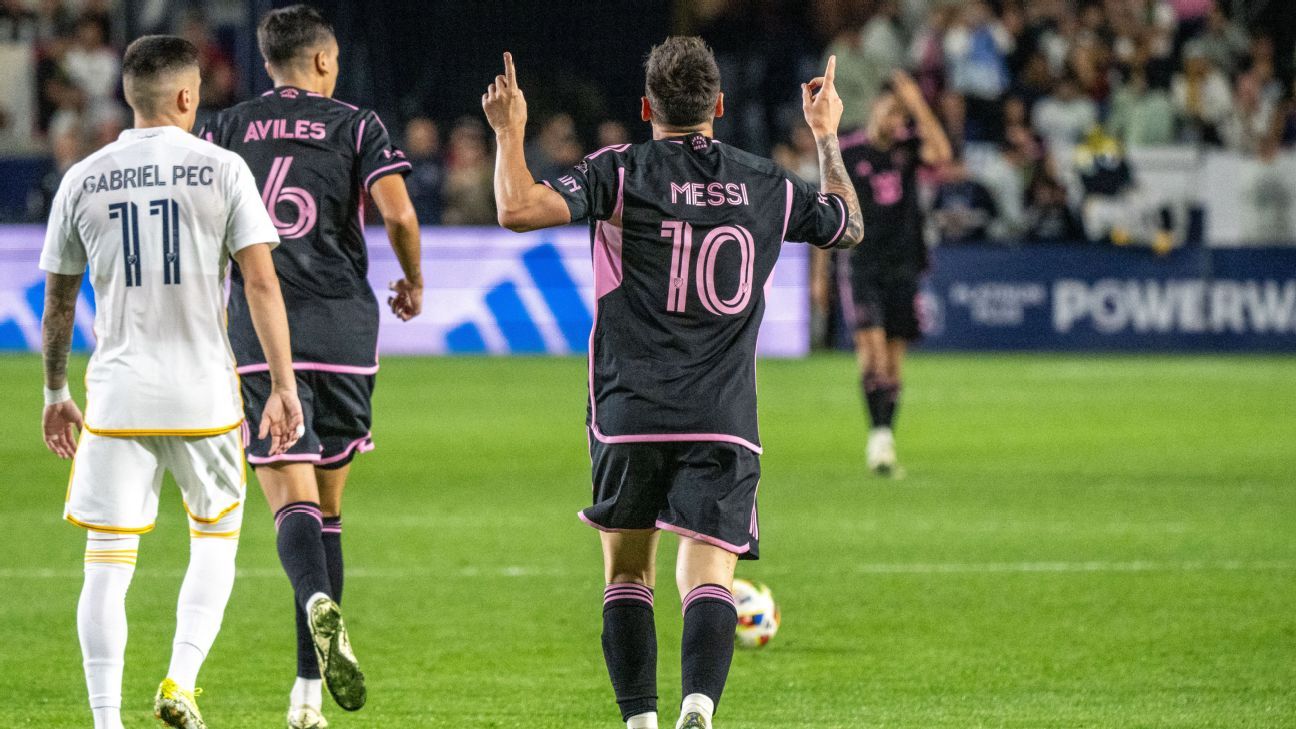CARSON, Calif. — Crowded into an unceremonious corner at Dignity Health Sports Park’s press box on Sunday, MLS commissioner Don Garber held an impromptu media availability minutes before the start of LA Galaxy’s first home game of the season against Inter Miami.
The topics varied, but it was clear that there was one idea that Garber wanted to get across early on: The significance of Sunday’s game and how it brought everything back full circle.
«To me this is very much about where we were in 2007 and where we are today,» he said. «Somebody, who’s probably one of you guys, wrote this article or a headline that said: ‘Will David Beckham change the course of soccer in America?’ He didn’t just do it once; he did it twice.»
Garber has a point. Last summer, Beckham, a former Galaxy player and current co-owner of Miami, paved the gilded path that led to MLS to sign arguably the greatest player to have ever played the sport: Lionel Messi. And his own high-profile introduction to the league with the Galaxy in 2007 started things off.
Then 31 years old, Beckham’s unexpected venture in America proved to be hugely successful, and it’s no coincidence that increases in club valuations, player salaries and media deals have followed. Due to a unique clause within his Galaxy contract, the former England captain was also given an opportunity to co-own a team once he had retired, leading to the debut of his Inter Miami franchise in 2020. Messi, with his own set of unique financial incentives, was won over by the Miami project.
– Stream on ESPN+: LaLiga, Bundesliga, more (U.S.)
0:52
Lionel Messi levels game for Inter Miami in 92nd minute
Lionel Messi scores off Jordi Alba’s pass to level the match at 1-1 vs. the LA Galaxy.
In the same manner as global soccer’s attention turned to MLS when Beckham arrived, «Messi-mania» has hit the U.S. at an even higher level through jersey sales, media attention and social media growth over the past eight months. And with no signs of the fervor dying down, Sunday’s highly anticipated match (with Beckham in attendance) marked the first time that the Galaxy had hosted Miami since the Argentine’s signing in July.
It was difficult to glance anywhere without seeing the World Cup winner’s name. Near Beckham’s statue outside of the stadium, countless kids and families sporting Messi kits excitedly milled around before the game. An undeniable buzz swept through the crowd of 27,642 and provided the energy usually found during a championship game or final. One fan, carrying a large sign asking for a match jersey from Miami, told ESPN that he had sold his car for $2,000 to help pay for his ticket.
Here at Dignity Health Sports Park for LA Galaxy vs Inter Miami. Met this fan who told me he sold his car for $2000 to get tickets for the game.
(Just in case, other side of the sign is in Spanish) pic.twitter.com/vQGrTDSRTV
— Cesar Hernandez (@cesarhfutbol) February 25, 2024
From a financial and marketing standpoint, the match was another home run in a growing list of Messi-related MLS games that are emerging as soccer Super Bowls of their own. According to a sales vendor working at a Dignity Health Sports Park booth, the cheapest ticket available two hours before kick-off was set at $650.
But on the field, it remains hard to tell whether Messi will be able to help Miami progress in his first full season, or if he’ll mirror the problems that Beckham had in his initial years with the Galaxy, where he needed time to adjust before winning his MLS Cup titles in 2011 and 2012.
Days after Miami opened up the season with a 2-0 home win against Real Salt Lake that was far from comfortable, Messi & Co. looked second best for most of Sunday’s 1-1 draw with the Galaxy. Granted, they maintained their undefeated start and Messi secured yet another trademark moment with a dramatic 92nd-minute equalizer, but Miami still ended the week with more questions than answers about its star players.
Striker Luis Suárez lumbered around Sunday, making no real impact; midfielder Sergio Busquets was susceptible on counters; and while Messi will take plaudits because of his late equalizer, the true man of the match for Miami was goalkeeper Drake Callender. Were it not for his heroics, which included an early penalty save in the first half, things could have gotten ugly for Miami.
«It’s something similar that happened in many games last year,» coach Gerardo «Tata» Martino said after the game. «He was decisive again, stopped the penalty, blocked some goal-scoring situations.»
The entire outcome could have also changed had the Galaxy not been reduced to 10 players moments before Messi’s equalizer, as midfielder Marky Delgado was sent off after a questionable pair of yellow cards.
«Really, really soft. I mean, really soft,» Galaxy coach Greg Vanney said about the decisions, which were notably handed out from a backup official due to an ongoing referee lockout in MLS. «It’s tough on a game like this, just where there’s so many people here to watch the game and it’s a big spectacle, too, you gotta be careful with handing out soft yellows, and it ultimately changes the game.»
This was called as a second yellow ..
pic.twitter.com/067n0Tnw7D
— herculez gomez (@herculezg) February 26, 2024
Miami’s players were clearly not content with how things went for large parts, either. When substituted in the 67th minute, Suarez angrily hit an unidentified object that launched across the team bench. Messi, unhappy with a lack of speed in the build-up play, openly chastised teammate Tomás Avilés for not giving him the ball in time.
Moments like these should be taken with a pinch of salt, but as mentioned earlier, Beckham also ran into similar problems. Like the Argentine, he arrived midseason to much fanfare in his debut tournament, but suffered injury problems that restricted him to just a handful of appearances in the first year. Beckham, who went on two loan spells to AC Milan from the Galaxy, took time to find his footing in MLS. Could the same thing happen to Messi?
Making sweeping judgements about how things could go in 2024 is premature regarding Messi, but if Beckham showed that it’s possible to thrive in MLS, he also showed that it’s not a given that it will happen from the get-go. As for MLS itself, we’ll see how it can capitalize on Messi’s presence. While the league is obviously gaining plenty by having the World Cup champion, it’s also doing so with blemishes along the way.
Back at the media availability with Garber before the game, the league commissioner attempted to put an optimistic spin on the league’s labor dispute with referees by highlighting the opportunities given to their last-minute replacements. According to Garber, another negotiation session is expected with the Professional Soccer Referees Association that recently rejected the ratification of a proposed CBA. Questions regarding the right approach to roster rules, which may or may not lead to more Messi-like additions, were also brought up.
«I’m leaving here and going to Miami, I’ve got 12 [club] owners — this is a little news — spending two days working on how should we be thinking about our roster rules going forward,» Garber said.
Behind the scenes, there’s also the yet-to-be-resolved matter of the U.S. Open Cup, which MLS attempted to essentially drop out of last December after announcing that only reserve teams, and not first teams, would take part in the domestic cup competition. Even dealing with the preseason has become a controversial talking point after Miami globetrotted its way through just one win in seven friendlies this winter, while also finding a way to anger the public from abroad in the process as well.
Whether it be Miami in its first full season with its new No. 10 or MLS in the beginning of a new year, it’s going to be interesting to see whether either will take the right approach in what is now a full-fledged era of Messi.
Sunday’s game was a well-deserved celebration for the full-circle moment that MLS has reached, but time will tell whether either Miami or MLS will find the right way to utilize the leading figure they currently have.

